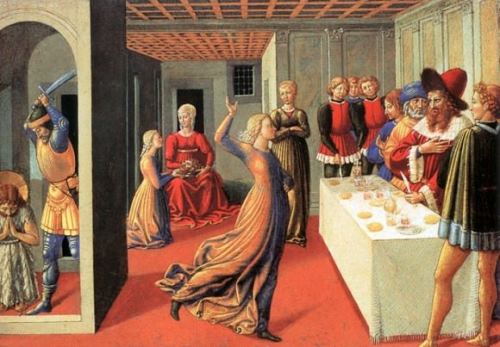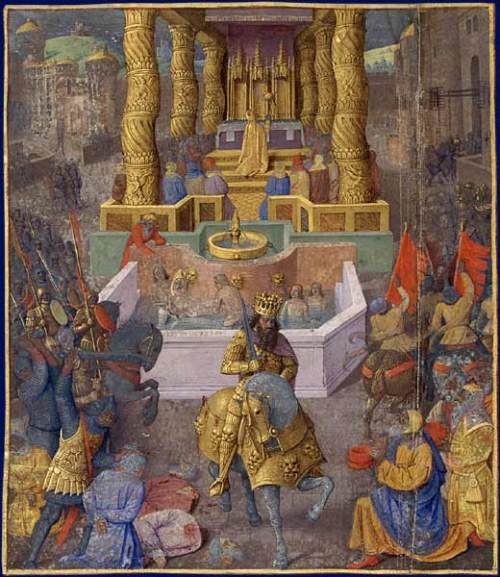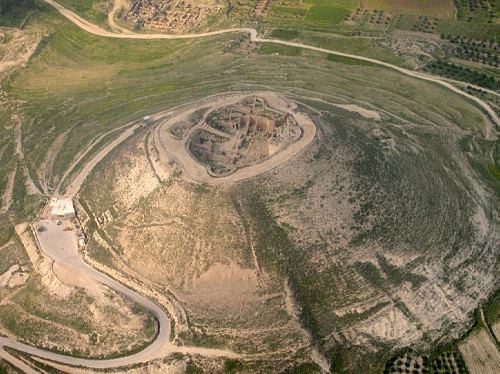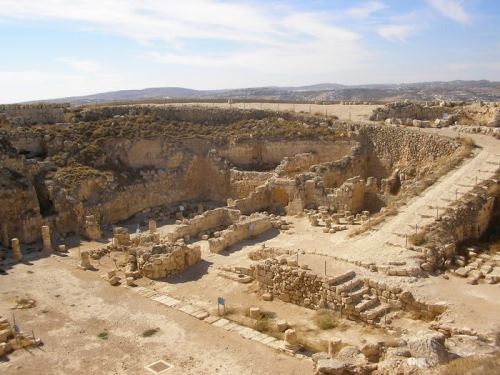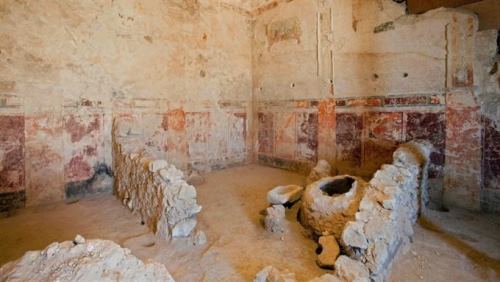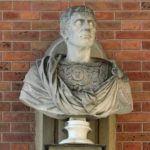Herod the Great
Being a cunning and treacherous man, Herod asked the magi to indicate to him where the baby was, “so that I can bow to him”. But they were not so simple: bowing to the baby, they went home a different way. And then Herod ordered the murder of all male infants under the age of two …
The name Herod for many centuries has a negative connotation. But not many people know that another Herod existed – a ruler who brought peace and prosperity to the Jewish land. Under his rule, Judea became autonomous from Rome. It was Herod I who went down in history under the title Great.
In 73 BC, the second son was born to the Roman procurator of Judea Antipater, who was named Herod.
With the consent of the Prosecutor of Syria at the age of 25 Herod received the first important post – the governor of Galilee.
Among his first steps in this position was the execution of supporters of the Hasmonean priestly dynasty and some of its representatives. This action caused both the approval of the Roman rulers and governors, and the fury of the Jews – because the Hasmoneans were considered the ruling dynasty. However, due to the strife between Hyrcanus II (the high priest from the Hasmonean dynasty) and Aristobulus II (the last independent king of Judea), the Hasmonean kingdom, which arose in 164 BC, was split into two parts. It mired in civil strife and lost its independence, being under patronage of Rome.
Immediately after the execution, the Jews called the governor of Galilee to a meeting of the Sanhedrin, the highest judicial authority. Herod arrived at the court, with the patronage of Sextus, the governor of Syria and one of the relatives of Julius Caesar himself. The Jews, realizing that they would have to judge not a simple person, enlisted the support of Hyrcanus II, who had the title of ethnarch (ruler of the people), granted to him by the emperor himself. Even the Roman proteges listened to the opinion of the ethnarch.
Before the start of the trial, Herod gave the ethnarch a message from Sextus, which contained a demand to drop the murder charge. Hyrcanus II could not disobey, but it wasn’t fair. Therefore, he postponed the trial, and advised Herod to hide. So, he found shelter in the administration of Sextus.
Suddenly, a coup occurred in Rome, during which the emperor was killed. Herod, who received Syria from the new ruler of the Roman Empire, moved his troops to Jerusalem. But before he could reach the main city of the Jews, a change of power in Rome took place again. Emperor Mark Anthony ascended the throne, who immediately elevated Herod to the rank of tetrarch (ruler of the fourth part) of Judea. The Jews who did not want to put up with this proclaimed Antigonus the son of Aristobulus II as their king. Herod’s troops entered the battle with the forces of Antigonus, to the aid of which came the Parthian kingdom, an ardent opponent of Rome.
In that battle, Herod was defeated and fled to Rome. The Jews and the Parthians celebrated the victory.
However, already in 37 BC Herod, who had received the title of King of Judea and was considered a friend of Rome, with the support of a huge number of legions, returned to the Holy Land and captured Jerusalem. He defeated the Jews and Parthians and executed Antigonus.
In order to consolidate his position and increase his authority among the people who hated him, Herod divorced his wife and married a representative of the Hasmonean dynasty, the granddaughter of Hyrcanus II Mariamne. However, as it is known from the works of Josephus Flavius, Herod actually loved Mariamne and declared his desire to marry her while still being governor of Galilee.
For over 30 years, Herod ruled over Judea. It was during his reign that Jewish bloodshed stopped and peace reigned, new cities and fortresses were built, and old ones were strengthened.
By order of Herod, a huge port, a hippodrome and a theater with 3500 seats were built in Caesarea. During the construction, advanced methods were used. “The king conquered nature itself,” wrote the Jewish historian and military commander Josephus.
Jerusalem had undergone a complete reconstruction. The rebuilt Temple of the One God, erected by Solomon, sparkled with new faces. The Wailing Wall, that has survived to this day, is the only one left from that temple reconstructed by Herod. The water supply system of the city was significantly improved. A new quarter with theaters and circuses was built in its northern part. Roman games were introduced in the city and a stage was built.
Under Herod, Masada became an impregnable fortress. It had an artificial water supply system, which was then a rarity. The fortress kept weapons and food supplies of the entire state, as well as the royal treasury. Also there were the royal palace and the synagogue in it. Until recently, it was believed that Jews had no need for synagogues while the Temple existed. However, during archaeological excavations, several synagogues that belong to the period of Herod’s reign were found.
The city of Herodion became an unprecedented architectural monument of that time. It consisted of two parts. In the upper part of the city was a cone-shaped structure of eight levels. The first five levels were residential. In the center were the royal palace, a Roman bath and a synagogue. The structure was surrounded on three sides by semicircular towers, except for the east. The east tower was round. In the lower part of the city, palaces and office buildings were built. A magnificent Roman-style garden with huge columns connected the upper part of the city with the lower. The garden was equipped with special areas for relaxation and dining. And in the center there was a huge pool, which was used not only for swimming and rowing, but also as a reserve tank with water.
The economically prosperous Jewish land became a hotbed of Roman and Hellenic culture. It was here that scientists, sculptors, architects, poets and artists of that time came together. In times of famine and catastrophe, Herod generously distributed donations not only to his subjects, but also far beyond the borders of Jewish land. In gratitude, the citizens of Olympia elected him the president of the Olympic Games.
Herod was a wise ruler. During the confrontation between Mark Anthony and Augustus, he decided to support the latter. For this, Augustus, becoming emperor, awarded the king of Judah authority over additional territories. Judea not only expanded its borders, but actually became autonomous.
However, Herod’s rule was not calm. His associates intrigued and fought for spheres of influence. Herod’s sister, Salome, who was considered the unspoken co-ruler of Judea, was the main schemer. Taking advantage of her brother’s hot temper and his fear of being overthrown, she persuaded him to execute his beloved wife Mariamne and her two sons. Herod had already executed Mariamne’s younger brother. This attitude to the heirs of the Hasmonean dynasty was the reason for the distrust from the Jews.
About six months before his death, Herod went to Jericho for treatment. In the capital, rumors of his death spread very fast. The people rejoiced. Several young people in the Temple threw off a golden eagle, symbolizing devotion to Rome. Young people were detained and executed. On March 12, 4 BC, the night after their execution, the inhabitants of Judea observed a total lunar eclipse. According to some historians, it was on that night that Herod passed away.
The English preacher and historian F. Farrar suggested that the ruler of Judea died “from a disgusting disease, which in history occurs only with people who disgraced themselves with bloodthirstiness and cruelty.” According to the version of the Russian writer and doctor A.P. Chekhov, Herod suffered from gonorrhea, the complications of which led to death. This version was contested by Professor of the University of Washington D. Hirschmann. He stated that Herod died as a result of chronic kidney disease. As it is known from history, in the last days of his life the suffering caused by the disease pushed Herod to insane actions. He ordered the execution of his eldest son and heir, which was done immediately. Only Herod’s last order to execute most of the court officials was not carried out.
Herod was an extraordinary and controversial person. He was smart, courageous and truly great. During the reign of Herod, the Jewish land flourished. Every year it became more and more independent from Rome. The possessions expanded, many incredible buildings appeared. For all the achievements Herod I can rightly be called Great.
But what about the biblical parable? After examining the life of Herod I, we can confidently say that he was not involved in the massacre of infants, which is described by Matthew. And the main argument here is that Herod I died a few years before the birth of Jesus Christ.

